Rustam Minnikhanov on decarbonisation: ‘We understood it already then that there was something against us’
The discussion of environmental adaptation of businesses to achieve carbon neutrality by 2050 was placed at the centre of the business agenda of the Tatarstan Petrochemical Forum
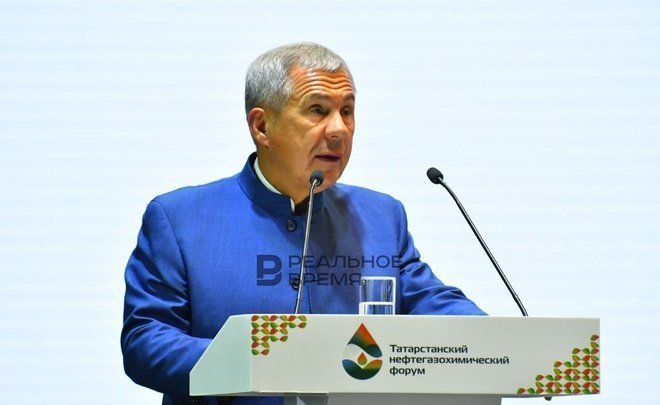
“Now we see that the legislative initiatives of the EC to decarbonise the world economy are being promoted by the countries that have limited hydrocarbon reserves. That is, in fact, they have no other choice. But at the same time, they overestimate the possibilities of alternative energy and underestimate the importance of traditional energy," Oleg Aksyutin, the deputy chairman of the Gazprom Management Board, criticised the political bias of the decisions of the European Commission. What happened to the European Green Deal a year after the announcement of a cross-border carbon tax in the EU was hotly discussed at the plenary session of the Tatarstan Petrochemical Forum. Gazprom is convinced that Europe's focus on liquefied natural gas from the United States will lead to “disregard for climate goals”, while in Russia, on the contrary, they continue to follow the environmental agenda. For example, at the end of the year, Tatneft is going to start CO2 injection under the ground, and SIBUR is switching to a closed cycle of resource circulation everywhere. Read the details in the material of Realnoe Vremya.
All friendly flags will visit us
Kazan has become an international discussion platform for discussing the global climate agenda, in which the main place is given to achieving carbon neutrality. By tradition, at the end of August, the Tatarstan Petrochemical Forum opened at Kazan Expo, which will bring together about 2 thousand industry specialists. As expected, the forum was attended by the president of the Union of Oil and Gas Industrialists of Russia, Gennady Shmal, who does not miss any such event, as well as Deputy Chairman of the Gazprom Management Board Oleg Aksyutin. The environmental agenda is also of concern to large Russian petrochemical companies, which have made it a rule to report on their strategy to the professional community.
It was on this topic that Mikhail Karisalov, the chairman of the Management Board, CEO of SIBUR PLC, and Nail Maganov, CEO of Tatneft PJSC, spoke that morning. And the guests of honour were Minister of Energy and Infrastructure of the UAE Suhail Mohammed Faraj Al Mazroui, Minister of Oil and Environment of the Kingdom of Bahrain Mohamed bin Mubarak Bin Daina and representatives of the People's Republic of China, from whom speeches were expected in the afternoon.
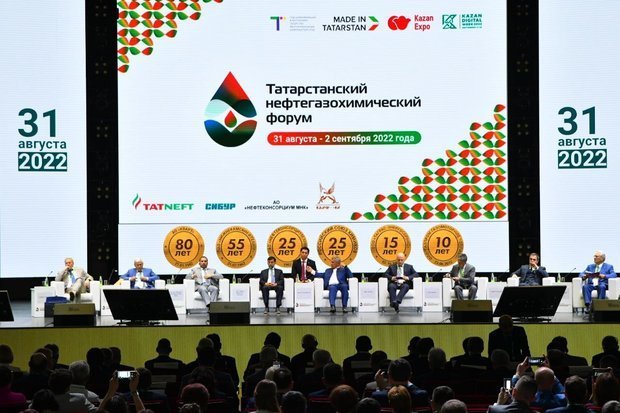
“These moments [of the meeting] are especially important now — in the face of sanctions from Western countries," said Gennady Shmal. “We solve the problems of how to survive in a difficult situation. I will speak frankly — we will survive. Our oil and gas complex works steadily, solves problems for the national economy and what is needed for export.
What happened to the European Green Deal
The discussion of environmental adaptation of businesses to achieve carbon neutrality by 2050 was placed at the centre of the business agenda of the forum This package of measures, called the “European Green Deal” to decarbonise the global economy, should reduce greenhouse gas emissions in the EU by 50% over the next decade (previously a 40% reduction was envisaged). The topic of the plenary conference was formulated with a certain intrigue: “The decision of the European Union on decarbonisation. A year later”. Oleg Aksyutin, the deputy chairman of the Gazprom Management Board, told about what happened to the environmental agenda in the EU countries.
First of all, he noted a slowdown in the pace of the “green” transition against the background of the strengthening of the international sanctions policy. According to him, ambitious decarbonisation goals have noticeably wilted, and some countries have been forced to return even to the use of coal, which is considered the most harmful type of fuel. Aksyutin pointed out that the regulatory policy on the introduction of a set of legislative initiatives was dictated by political goals, and in the West people speculate about people's concerns about climate change.
“Recently, a financial system of rating institutions has been consistently created in Western countries to assess the so-called energy transition. In fact, this created a “web effect”, in which public and political pressure was created on energy companies," he noted.
According to Aksyutin, the idea of decarbonisation is promoted by countries that have a limited supply of hydrocarbons, and in fact, they have no other choice.
“In May of this year, Russian President Vladimir Putin, at a meeting on the development of the oil and gas industry, noted that in the West people are speculating about people's concerns about climate change. It is quite obvious that for domestic political reasons, the West has begun to overestimate the possibilities of alternative energy and underestimate the importance of traditional energy," the deputy chairman of the Gazprom Management Board criticised.
Cross-border tax will be calculated in new units
Oleg Aksyutin said that the introduction of a cross-border carbon tax, which worries Russian exporters, is being reviewed, and the final agreement of the terms is expected in the autumn of 2022.
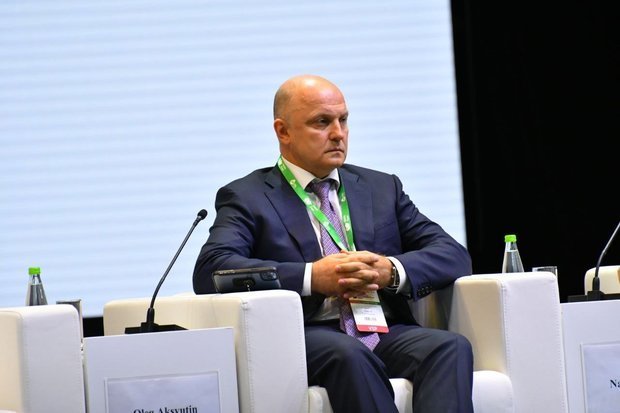
“Last year, there were a lot of discussions on cross-border carbon regulation, which is being introduced for imported goods. A year has passed, but the final agreement has strayed from the conclusion," he said.
Now, according to him, as a response, experts are promoting the idea of introducing carbon units. But the catch is that the compensation of emissions from the national market of carbon units is impossible according to the rules proposed by the EU. He urged European partners to be more balanced when calculating the carbon tax.
Gas exporters are being spurred on by another attack.
“Last December, the European Commission published a winter package of legislative initiatives in the field of decarbonisation of the gas market," Aksyutin said. “It proposes a ban on the conclusion of long-term contracts for the supply of fossil gas with a validity period after 2049. According to the EC, they create a barrier to access to the market of renewable sources and low-carbon sources of gases.
Therefore, it is proposed to ensure access of renewable energy to the existing gas network, as well as cross-subsidising of producers.
“The main goal is to reduce the consumption of EU fossil gas by promoting renewable sources," said the Deputy Chairman of the Gazprom Management Board. So far, this initiative is at the initial stage.
“Methane index” for Gazprom
Another tightening of the requirements for the export of energy resources may follow with the introduction of the “methane index”. Until now, it was about carbon regulation, which takes into account only carbon dioxide emissions, but now regulation in the field of methane is proposed, that is, the “methane supply index," Aksyutin said. But European countries can also manipulate this tool.
“Methane emissions from shale gas production in the United States are 18 times more than from Russian gas production," Aksyutin said.
Nevertheless, European states are focusing on LNG from the United States.
“The increase in LNG supplies from the United States led to an increase in emissions in the first half of the year by 13 million tonnes of CO2 equivalent. There is a disregard for climate goals," the speaker noted. “As a result, we see the ignoring of Gazprom's verified data and the juggling of expert opinions. This indicates the lack of prospects for a fair assessment of the methane footprint. Independent experts' research shows that of all the natural gas supply routes, pipeline gas from Russia is one of the most environmentally friendly, but it is clear why the choice was made in favour of LNG," the deputy chairman of the Gazprom Management Board reasoned. “The current crisis in the European energy market is the result not only of the sanctions policy of Western countries, but also of more fundamental prerequisites. Namely, underestimation for the sake of traditional energy and significant underinvestment in exploration and production under pressure from supporters of “green” energy.
Tatneft will inject CO2 under the ground
Meanwhile, in Russia, on the contrary, they continue to follow the environmental agenda. Nail Maganov, the director general of Tatneft PJSC, said that at the end of the year the company is going to start injecting CO2 under the ground. The company's strategy provides for achieving carbon neutrality by 2050, so all efforts are aimed at capturing carbon dioxide using domestic units.
“I hope that by the end of the year we will get permission for trial injection of CO2 into the reservoir," Maganov said, adding that SIBUR is discussing “where and what CO2 resources we will inject”.
Besides, Tatneft continues to plant trees throughout the oil production area. If earlier 5 million were planted a year, now it is 8 million.
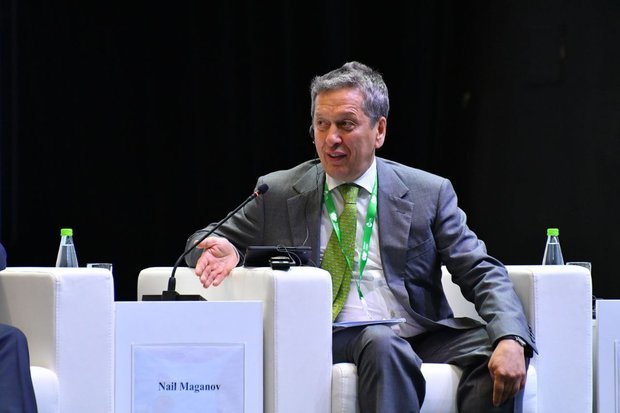
“We are not competing with anyone — it's just more profitable," he explained.
Mikhail Karisalov, the chairman of the Management Board, CEO of SIBUR PLC, spoke in unison with him. According to him, the main goal of the company is responsible management and a clear policy not in favour of fashion trends. It consists in the use of closed flare units, a closed circulating water supply system. Another phobia of SIBUR is plastic bottles, or rather, how to dispose of “plastic islands”. He said that two carbon landfills are used to test the technology — in Tyumen Oblast and Voronezh Oblast, where SIBUR's main capacities are concentrated. However, new solutions are found impromptu. He said that following the example of Kazan, the company was thinking about the disposal of silt fields in Nizhnekamsk.
“The mayor of Kazan told me: 'Do you know what we have opened here for the disposal of sludge? And I myself am from Nizhnekamsk and I know that there are such questions at the plant.” And this gave rise to a mini-programme of adopting the experience, which was implemented by the authorities of Kazan and the government of Tatarstan," Karisalov shared. According to him, Nizhnekamsk is searching for scientific and technical solutions for Nizhnekamskneftekhim's silt maps, which have been around for decades.
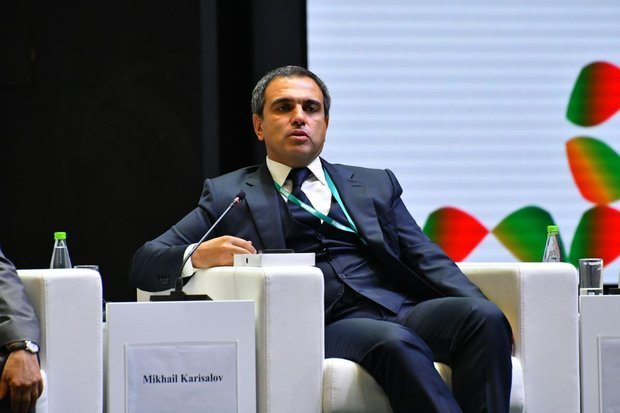
Tatarstan President Rustam Minnikhanov drew a line under the discussion of decarbonisation.
“We understood that there was something against us in this decarbonisation," he said seriously.
According to him, the very idea of decarbonisation is necessary, as it promotes the use of gas-engine fuel and high-quality thermal insulation in the country.
“But when our 'partners' try to solve this problem at the expense of other countries, it is completely wrong," he concluded.